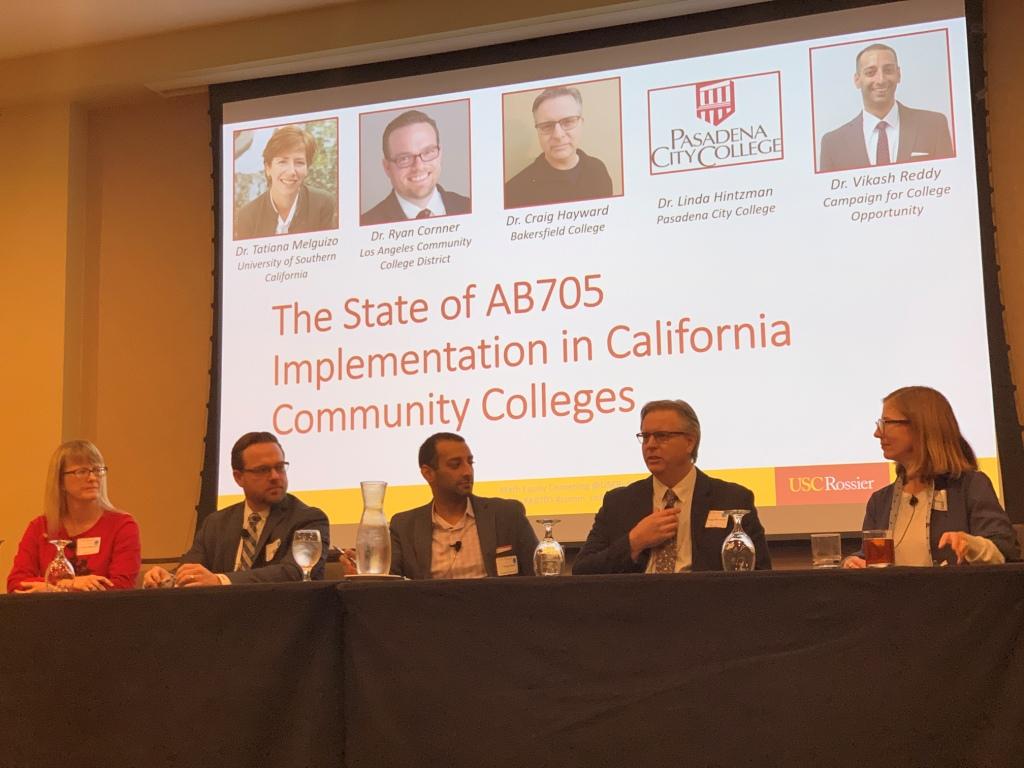
Math Equity Convening Tackles Tough Questions Around AB705 Implementation
In December, 2019, researchers, policymakers, and practitioners gathered at the University of Southern California for a full-day Math Equity Convening hosted by The Pullias Center for Higher Education and facilitated by the center’s own Dr. Tatiana Melguizo to discuss developmental education policies in Los Angeles community colleges and how colleges can successfully adapt to the new demands of AB705 governing academic remediation in the state. Participants shared their experiences with developmental education, expressed hopes for the future, shared concerns about the challenges facing successful reform, and presented research showing how great the need is for reform.
The day started with the sharing of research looking at the impact of traditional (pre-AB705) academic remediation policies on students. Professor Melguizo and co-researcher Professor Ngo summarized the findings from the NSF funded research on college readiness standards misalignment between high school and college. One such finding was that academic remediation policies prior to AB705 implementation led many students to experience inter-sector misalignment in both Math and English. Almost half of Los Angeles community college students who were deemed “college-ready” in math according to high school standards were placed in developmental math (below Algebra 2) when they transitioned to community college. This math misalignment is particularly severe for black and Latina/o students with more than one third experiencing the misalignment. Even for STEM-aspiring students who passed higher level math courses in high school, 60 percent were placed below college-level math when entering community college. Sixty-nine percent of students who passed A-G English with a B or better in high school had to take at least one developmental English class after enrolling college.
The research also revealed that college faculty are concerned about variation in grading standards across high schools and show more faith in standardized scores. They feel overwhelmed with all of the challenges they face as teachers in placement testing reform and are worried that such reform will lead to larger class sizes. The research also showed that teachers generally make no assumptions about their student’s abilities and instead build assumptions off of each student’s standardized test scores.
The morning wrapped up with a panel discussion featuring the perspectives of community college faculty, community college system leadership, college success nonprofits, and researchers. In this wide-ranging discussion, panelists talked about the need for reform and their hopes and concerns for AB705 implementation. They generally felt that the current system of placing incoming students in developmental education lowered their chances of completing a degree and hurt students’ self-efficacy and believed that AB705 has the potential to change that. As much as the stakeholders want to see results immediately, the consensus was that change and implementation will take time.
The afternoon session featured a robust panel discussion among the Convening participants about the potential for AB705 implementation to improve student outcomes and the challenges to successful reform, which revealed lingering question to address around the potential success of the initiative.
This included concern about to what extent institutions are prepared or able to follow-through with AB705 implementation at multiple levels, such as administratively, at the classroom level, and in student advising, particularly in the context of other reforms currently underway in California. The question was also raised about to what extent staff and faculty are “bought into” the need for reform, given that many have been teaching developmental classes their entire career. How can an academic advisor adjust to avoid steering underrepresented students into “voluntary” developmental courses? How can faculty and institutions successfully support students as these changes are implemented? A discussion also considered how can the K-12, community college, and four-year university systems can become more aligned to facilitate student transitions between sectors.
As the Pullias Center in general, and Dr. Melguizo’s team in particular, move forward with their research-practice partnership to evaluate the implementation of AB705, these issues and other will be looked at systematically with an eye towards the goal of working with stakeholders to understand how to best support students.
A video re-broadcast of the entire Math Equity Convening is available to stream online. Subscribe to the Pullias Center newsletter to be kept abreast of future research around AB705 implementation and the efforts to achieve math equity in higher education.